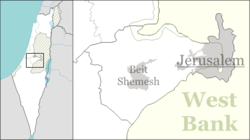Israeli
Prime Minister Ehud Olmert called the attack "horrible". [22] Olmert also said that the Mercaz Harav yeshiva had produced, "the finest soldiers for many generations; people who have realized the Zionist faith. This yeshiva—which was founded by Rabbi Abraham Isaac Kook—has educated and nurtured tradition and legacy, as part of Israel's resilience." [23] A spokesman for Olmert said Israel would act after proper investigation and deliberation, and he condemned those, like Hamas, who celebrated the killings with parades in Gaza. "That Hamas calls this a heroic act, and praises it, this exposes them for what they are", the Olmert spokesman said. [10] However in their grief Olmert was not welcomed to visit the place of Torah learning. A yeshiva spokesperson told Ehud Olmert that he was not welcome at that time, saying it wanted to "save him and us the embarrassment." [24]
Dalia Itzik of the ruling Kadima party, speaker of the Knesset and acting president while Shimon Peres is overseas, called for the demolition of the mourning tent for the killer and the demolition of his family's home. [25]
Thousands in Israel mourned the deaths of those killed, observing Jewish traditions of mourning, with the murdered victims buried on Friday. [26]
A Channel 1 report that three alumni of the yeshiva were planning a revenge attack against a senior Arab official affiliated with a mosque on Jerusalem's Temple Mount, allegedly with permission from several rabbis, was dismissed by Public Security Minister Avi Dichter and the Shin Bet as baseless following their investigation. National Religious Party's MK Zevulun Orlev said he suspected the allegations were an attempt to "blemish religious Zionism." [27] [28] [29]
Education Minister Yuli Tamir, who made a condolence visit to the yeshiva two days after the shooting, left and later claimed '[I] was kicked in the back twice, spat at, and verbally attacked by dozens of youths outside building', they called me 'murderer' and they said that "the Left is to blame for everything." [30] She had said at the Yeshivah itself "This [hostility to the left as she saw it] reminded me of the days before (former Prime Minister Yitzhak) Rabin's murder. It's unfortunate that there is a public which cannot put limits from[ sic ] itself. I only came to pay my respect to the murdered, not to engage in politics." [23] The next morning Yuli Tamir threatened to cut off funding for the yeshiva, citing a lack of "democratic values". [31]
The Israel Football Association called for a minute's silence prior to the weekend's football matches, though it was marred in Sakhnin where some supporters of the Arab Bnei Sakhnin team booed. Bnei Sakhnin F.C. spokesman Mundar Haleileh said his club honored the moment of silence, "but we don't have full control over all fans. The association made the decision, and perhaps mixing politics with soccer is a matter to be discussed." [32]
On 17 March, hundreds of activists attacked Arab homes in the east Jerusalem neighborhood Jebl Mukaber in an attempt to raze the house of the family of the gunman. For three hours, the activists chanted "revenge, revenge", vandalized property of the Arab village (which the police tried to prevent), and clashed with the police, whom they accused of "guarding the murderers." Many of the protesters were part of the settler movement and carried signs with slogans such as "Expel the Arab Enemy" and "The Land of Israel for the Jewish People" while others shouted "kill the Arabs". Despite a heavy police blockade at the entrance to Jebl Mukaber and a massive deployment of security forces in the area, the marchers managed to enter the village, stone residents' homes and damage a couple of cars belonging to villagers. The police declared the demonstration illegal, and finally forced the protesters to leave. [33]
At a memorial event one month after the attack, former Sephardi Chief Rabbi Mordechai Eliyahu told an audience of around 1,000 people that, in response to the attack, the government should establish a yeshiva or Jewish township for each life lost. He added "Even when we seek revenge, it is important to make one thing clear – the life of one yeshiva boy is worth more than the lives of 1,000 Arabs." However, other National Religious voices were more moderate. In the same one-month commemoration event, the Chief Rabbi of Ramat Gan, Rabbi Yaacov Ariel, reminded his audience:
We do not seek revenge, only retaliation ... we are against killing innocent people or harming children. [34]
The Israeli human rights group B'Tselem released a statement condemning the attack which read: "B'Tselem severely condemns the Palestinian terror attack that took place in a yeshiva (religious school) in Jerusalem, in which 8 Israeli civilians, including 4 minors were killed and many other persons were injured. Attacks aimed at civilians are immoral, inhuman, and illegal." [35]



